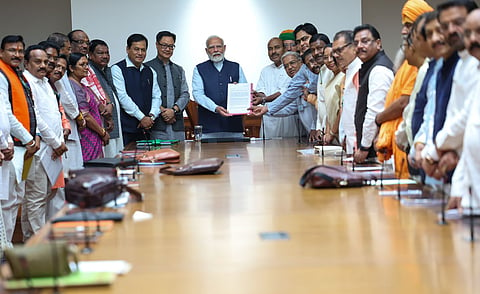
New Delhi- The Supreme Court's recent decision on the sub-categorization of Scheduled Castes (SC) and Scheduled Tribes (ST) has stirred political reactions. In response, BJP MPs representing SC/ST communities met with Prime Minister Narendra Modi in Parliament on Friday.
The MPs collectively submitted a memorandum to the PM, urging that the Supreme Court's remarks regarding the creamy layer for SC/ST should not be implemented in their communities.
The PM assured them that he would review the matter. Both Chirag Paswan of the Lok Janshakti Party (Ram Vilas) and Ramdas Athawale have expressed opposition to the decision. Paswan stated that his party would appeal against the ruling.
On August 1, the Supreme Court ruled that states have the constitutional authority to sub-categorize within SCs to allocate reservations to those communities that are socially and educationally more backward.
The Court clarified that states should base sub-categorization on 'quantitative and performance-based data' related to backwardness and representation in government jobs, not on 'discretion' and 'political benefits.'
Prime Minister Narendra Modi addressed the controversy surrounding the Supreme Court's ruling on SC/ST sub-categorization by posting on his X handle. He shared that he met with a delegation of SC/ST MPs, reiterating his government's commitment to the welfare and empowerment of SC/ST communities. The PM's reaffirmation comes amid growing political reactions and calls for intervention from various quarters following the Court's decision, which allows states to sub-categorize within SCs and STs for more targeted reservations.
AAP MP Sanjay Singh also raised concerns about the Supreme Court's ruling, questioning the implications for SC/ST reservation. Singh pointed out that once a person from an SC/ST reserved seat becomes a legislator or MP, they would be considered a creamy layer and unable to contest from that seat again, leading to reduced representation for the marginalized communities in Parliament and state assemblies.
Chief Justice DY Chandrachud, in his 140-page ruling, affirmed that states have the power to identify different categories of social backwardness and make special provisions, such as reservations, under Articles 15 and 16 of the Constitution.
Meanwhile, as reported by TOI, central ministers Chirag Paswan and Ramdas Athawale have both voiced opposition to the Supreme Court's decision, which allows states to create sub-groups within the SC quota of 15 percent. Paswan has announced that his party will appeal against this decision, while Athawale has rejected any move to apply creamy layer criteria to SC/ST reservations.
You can also join our WhatsApp group to get premium and selected news of The Mooknayak on WhatsApp. Click here to join the WhatsApp group.